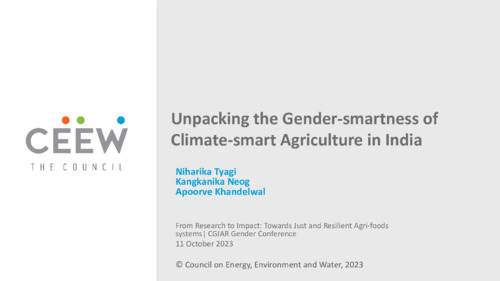Unpacking the Gender-smartness of Climate-smart Agriculture in India
Abstract
The gender gap in agriculture is a global pattern in which women in agriculture have limited access to land, productive resources, financial capital, information, technology and advisory services when compared to male farmers. Given that women comprise a significant portion of the agricultural workforce, it is crucial to ensure climate-smart agriculture (CSA) policies and interventions are gender responsive. Embracing a gender-responsive approach in CSA entails addressing the distinct gender needs, roles and lived realities of farmers. Ensuring accessibility and inclusivity in sitespecific CSA strategies is fundamental for maximizing agricultural potential and facilitating equitable benefits for all farmers. This evidence-based policy research assesses the scope for advancing gender-responsive CSA in India. The gender analytical framework for CSA assesses the gender-responsiveness of policies and institutions, while also reviewing evidence from interventions on climate-adaptive water management practices in Odisha, Uttar Pradesh and Bihar. Only 45% of the analyzed policies incorporate provisions for women farmers, primarily focusing on participation in capacity-building programs, while neglecting holistic gender-responsive investment, planning and implementation. Further, the study reveals only 32% of the water management interventions across states employed a gender-responsive approach, while 40% employed a gender-aware strategy that addresses women’s practical needs but does not challenge structural gender inequalities and ideologies. This research highlights the gender gap in agriculture and recommends niche opportunities for policies, interventions and investments urging genderresponsive approaches for inclusive and equitable CSA outcomes.

